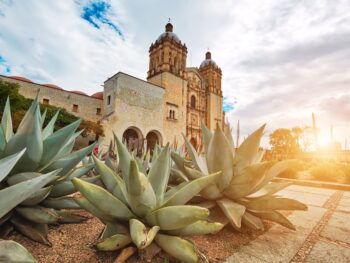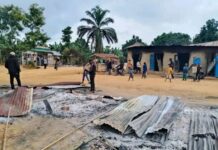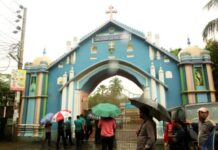By Linda Burkle, Ph.D., ICC Fellow —

In November 2023, I had the privilege of attending and speaking at an evangelical pastor’s conference in Oaxaca, a city in southern Mexico. Every pastor attending the conference has experienced various levels of persecution, and I interviewed several of those attending. The conference was hosted by Pastor S.M. of Iglesia Evangelica Nacional, whom I first interviewed by phone in 2021. He has been at the forefront of evangelistic efforts to indigenous minority groups in unreached remote mountainous regions and church planting amid persecution. Many people in these communities, which maintain a separate identity and language, practice “Christo-paganism,” a syncretistic blend of ancient pagan practices and Roman Catholicism. In addition, there is a strong atheistic communist movement, most notably in the state of Chiapas.
During the November conference, I interviewed Pastor S.M. again. He stated that Evangelical Christianity is viewed negatively as an American “Yankee” religion. Christians are blamed for the poverty in the region. Pastor S.M. has personally experienced being arrested and imprisoned and having his church burned and property confiscated. He literally was run out of town at gunpoint. The persecution has not deterred him from his ministry. In fact, he is making inroads into mountainous villages that have not been reached by the gospel and have had no Christian presence.
As I wrote in a previous article, “Religion, Tradition, and Persecution: The Plight of Christians in Mexico,” published by International Christian Concern in February 2021: “Persecution has a variety of sources and forms. Drug cartels may target Christians because they do not approve of drug use nor participate in illegal activities and are averse to bribes. Persecution is most prevalent in the mountainous regions of the southern states of Chiapas, Oaxaca, and Yucatan. The indigenous people who populate these rural areas practice a syncretic religion that mixes Catholicism with pre-Hispanic Mayan beliefs. Communal life is centered around various religious holidays and traditions which promote drunkenness. All community members are expected to contribute to these events both with money and service. Evangelical Protestants who cannot afford to contribute or who do not wish to participate in community religious holidays are intensely pressured to do so, first with fines or jail time. If they still refuse, they are denied basic services such as water and electricity that are guaranteed in Article 4 of the Constitution. Their churches and homes are burned, and belongings are confiscated. They are then forced to leave the community.”
Although the Constitution of Mexico guarantees all persons the right to practice their religious beliefs and ceremonies, local political leaders, supported by the Catholic majority, have significant autonomy in indigenous communities, using Mexico’s “Law of Uses and Customs” to force Evangelicals to comply. The state government seldom intervenes. Rather, they relocate the persecuted outside of their community. In April 2019, Mexican publication Somoselmedio, reported that “over 700 people from 115 indigenous families had been expelled from nine different communities for failing to participate in local Catholic festivals.”
With approximately 83% of Mexicans identifying as Catholic, “The Catholic Church in Mexico has historically been one of the most powerful and politically conservative institutions in Latin America. Deeply embedded in Mexican society and culture, the Church fiercely defended its effective monopoly over religious practice — particularly as a bulwark against Yankee Protestantism.”
When I first spoke with Pastor S.M. by telephone in 2021, I asked him at the conclusion of the interview if there was any hope for change. He responded that if the churches come together with one voice, they could leverage political power for change. Since then, Pastor S.M. has been instrumental in forming an association of evangelical pastors, which now includes 20 churches and 40 missions. This association, Nacional Nueva Generacion, provides mutual support to members and leverages united political clout in responding to persecution. They also engage the media to draw attention to acts of persecution, while the government prefers to downplay such occurrences. While Evangelicals have united collectively to mitigate persecution, it still very much occurs. According to the Open Doors World Watch List 2023, Mexico is ranked 38th of the top 50 countries where persecution is prevalent.
In interviewing several pastors who attended the conference in Oaxaca, I listened to firsthand accounts of persecution as summarized here: Pastor E.Z. stated that in Chiapas, the Catholic church created a paramilitary unit carrying AR-15 guns, expelling 1,500 Evangelicals from their community. Pastor A.P.S has been going to unreached communities in remote mountainous regions where 60% practice witchcraft. He shared that there is strong opposition to the gospel, pastors have been shot, and local religious leaders have discouraged community members from accepting the gospel. Evangelists have been detained and questioned by local authorities. The city council held a town meeting where people expressed a desire to kill Pastor A.P.S. but he was jailed instead. In jail, he prayed, and some people started to support him. He was released from jail on the stipulation that he not preach or evangelize. However, he continued to teach those who wanted to hear the Good News, and miracles followed. Five or six witches received the gospel, and 200 people became believers attending church. However, some witches have continued to harass him and have made attempts to kill him.
Another pastor shared that the Catholic church demanded that he contribute to their celebrations. He refused and was subsequentially denied basic services and needed supplies, such as concrete and fertilizer. Pastor E.M.R. described how he courageously addressed a potentially fatal situation. The village mayor was murdered, and then the federal workers left in fear. With the federal government’s presence gone, the locals attacked him. They shot at his house, denied him water and medical services, and expelled his children from school. His family feared they would be killed. Pastor E.M.R. saw a need for medical services and transformed the church into a clinic, although they had no medicine they relied on prayer. The community realized the church was there to help and become more tolerant. Some church members were teachers and started providing secondary education five hours a day. Pastor E.M.R. experienced a change in community attitudes as his church provided needed services. He stated he had no option but to pray and rely on Jesus. The Lord protected him and used him to bless those who had persecuted him. These are just some of the powerful testimonies of those risking everything to reach people for Christ. Let’s continue to pray for their protection and favor.
To read more stories like this, sign up for ICC’s free monthly magazine.





